'The only Black one left:' Alberta village remembers its African-American roots
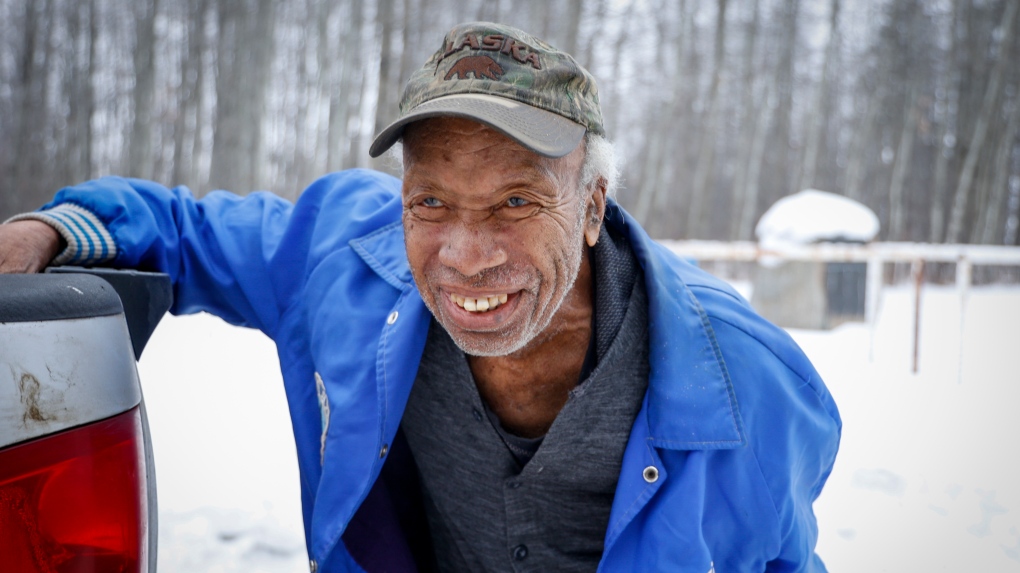 Vant Hayes, 88, visits a cemetery in Breton, Alta., on Monday, Jan. 16, 2023. Originally called Keystone, which was established in 1909 by a group of African-American immigrants. The new Black Canadian homesteaders arrived from Oklahoma, Kansas, and Texas, just four years after Alberta became a province in 1905. THE CANADIAN PRESS/Jeff McIntosh
Vant Hayes, 88, visits a cemetery in Breton, Alta., on Monday, Jan. 16, 2023. Originally called Keystone, which was established in 1909 by a group of African-American immigrants. The new Black Canadian homesteaders arrived from Oklahoma, Kansas, and Texas, just four years after Alberta became a province in 1905. THE CANADIAN PRESS/Jeff McIntosh
"My name is Vant Hayes and I'm the only Black one left out here."
Hayes, who says he's 88 years old or "somewhere around there," represents the end of an era in the village of Breton, 110 kilometres southwest of Edmonton.
His grandparents William and Mollie Hayes and their children moved to the area from Oklahoma in the early 1900s as part of the Great Migration of Black settlers from the United States, lured by the promise of free land and a better life.
An increase in discrimination in the southern U.S. in the early 1900s led to an exodus of African Americans to four tiny communities in Alberta. Breton, originally known as Keystone, was one.
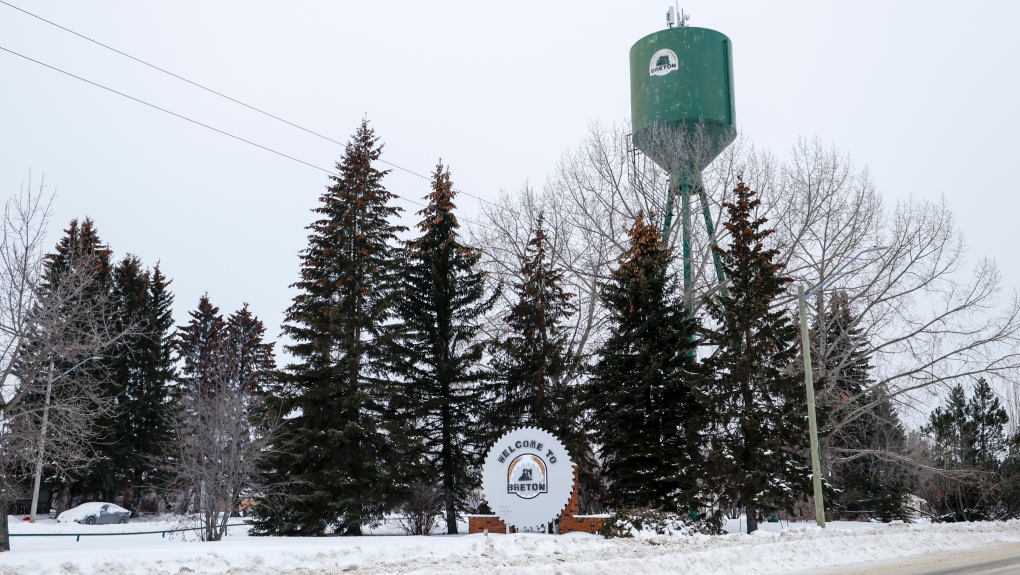 Breton, Alta., pictured on Monday, Jan. 16, 2023, was originally called Keystone, and was established in 1909 by a group of African-American immigrants. The new Black Canadian homesteaders arrived from Oklahoma, Kansas, and Texas, just four years after Alberta became a province in 1905. THE CANADIAN PRESS/Jeff McIntosh
Breton, Alta., pictured on Monday, Jan. 16, 2023, was originally called Keystone, and was established in 1909 by a group of African-American immigrants. The new Black Canadian homesteaders arrived from Oklahoma, Kansas, and Texas, just four years after Alberta became a province in 1905. THE CANADIAN PRESS/Jeff McIntosh
Most of the descendants of the original 54 families have moved on, but Hayes remains.
"You would get a quarter (section), but you had to clear 10 acres on it before you could get the title. I guess that was one reason they migrated here. Another one was in the States. It was bad down there," he said.
The migration hit its peak between 1909 to 1911. A federal order-in-council in 1911 barred Black people from Canada because they were "deemed unsuitable to the climate and requirements" of the country, but it was repealed later that year.
Hayes' parents, Floyd and Elizabeth, moved their 10 children briefly to Kelowna, B.C., to find work, but returned to the homestead after the father died.
"It was tough. You try and look after 10 kids. You gotta figure out how you're going to feed them today and the next day and we made it through," Hayes said.
"We ate a lot of eggs … a lot of chicken too," he added with a laugh.
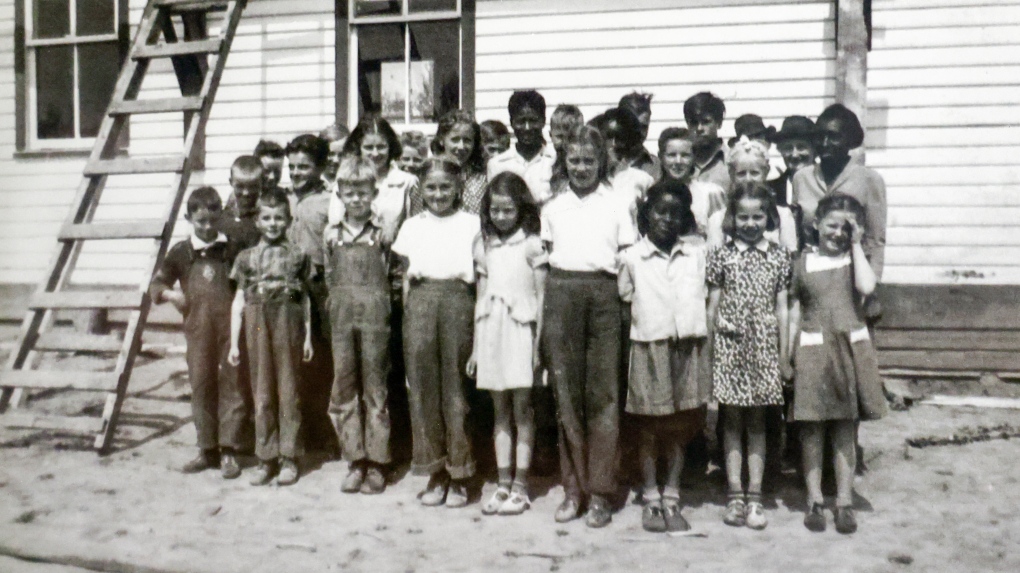 Students of the Funnell School are pictured in 1943 in a photo on display at the Breton Museum. Breton, Ata., originally called Keystone, and was established in 1909 by a group of African-American immigrants. The new Black Canadian homesteaders arrived from Oklahoma, Kansas, and Texas, just four years after Alberta became a province in 1905. THE CANADIAN PRESS/HO-Breton Museum
Students of the Funnell School are pictured in 1943 in a photo on display at the Breton Museum. Breton, Ata., originally called Keystone, and was established in 1909 by a group of African-American immigrants. The new Black Canadian homesteaders arrived from Oklahoma, Kansas, and Texas, just four years after Alberta became a province in 1905. THE CANADIAN PRESS/HO-Breton Museum
But Hayes said despite the new surroundings, his mother never got over the treatment she received in Oklahoma.
"A lot of people had moved up from the States and they figured this was the same as the States. My mother always carried a .43 Mauser rifle in the wagon with her. It was just for protection," said Hayes.
"One guy came riding up on this big horse and he started yelling at her and calling her names. She came back with this big .43 Mauser and said: 'If you don't get out of my yard right now, I'm going to shoot the horse and when you're running I'm going to shoot you, too.'
"After that, he was real nice," he added with a chuckle.
Hayes spent years working on oil rigs but always came back to the farm. He hopes one of his granddaughters will carry on the family legacy.
He's worried about the local history disappearing when he dies.
"You're not going to have this Black history," he said. "It's not going to go on forever."
Brandy Fredrickson's great, great grandparents Sam and Neoma Hooks moved with their four children from Sharpes, Okla., in 1911.
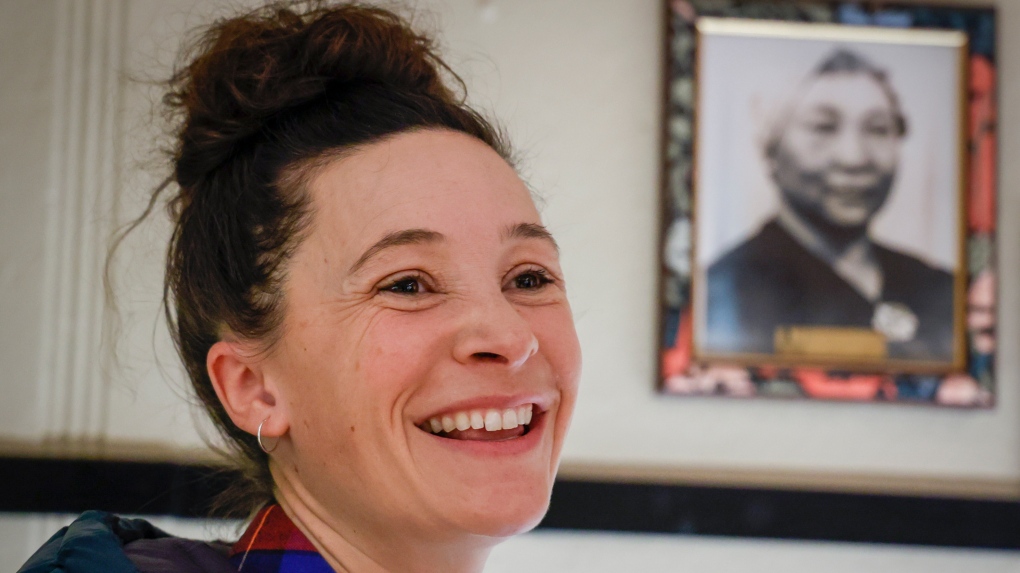 Brandy Fredrickson, with a photo of her ancestor Neoma Hooks at the Breton Museum, in Breton, Alta., Monday, Jan. 16, 2023. Breton was originally called Keystone, and was established in 1909 by a group of African-American immigrants. The new Black Canadian homesteaders arrived from Oklahoma, Kansas, and Texas, just four years after Alberta became a province in 1905. THE CANADIAN PRESS/Jeff McIntosh
Brandy Fredrickson, with a photo of her ancestor Neoma Hooks at the Breton Museum, in Breton, Alta., Monday, Jan. 16, 2023. Breton was originally called Keystone, and was established in 1909 by a group of African-American immigrants. The new Black Canadian homesteaders arrived from Oklahoma, Kansas, and Texas, just four years after Alberta became a province in 1905. THE CANADIAN PRESS/Jeff McIntosh
She said remembering the area's past is important because "you lose those shreds of history" as older people pass away.
"I know we're fifth and my kids are sixth generation," she said, wiping away tears. "To me, it's to know where they came from."
Allan Goddard, the curator of the Breton and District Historical Museum, grew up nearby but wasn't aware of the area's Black history.
He said some early homestead records had Black landowners' race specified as their nationality in the corner of the page, which was not the case for white ones.
"They were Americans. That was quite eye-opening to me," said Goddard. "Were they being identified to send them to a certain area or were they being identified just based on colour?”
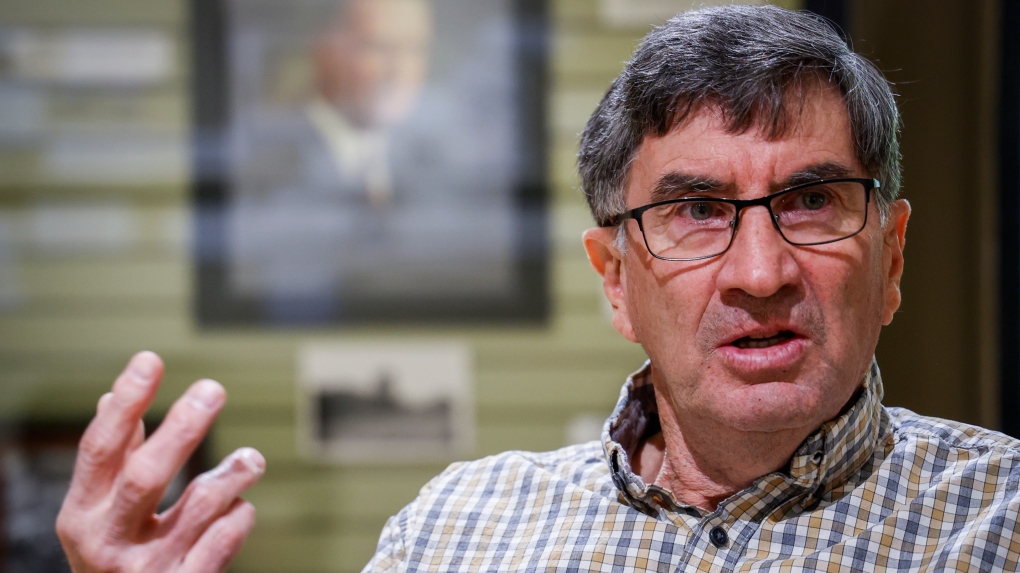 Allan Goddard, museum curator, speaks about Breton, Alberta, originally called Keystone, and was established in 1909 by a group of African-American immigrants, in Breton, Alta., Monday, Jan. 16, 2023. The new Black Canadian homesteaders arrived from Oklahoma, Kansas, and Texas, just four years after Alberta became a province in 1905. THE CANADIAN PRESS/Jeff McIntosh
Allan Goddard, museum curator, speaks about Breton, Alberta, originally called Keystone, and was established in 1909 by a group of African-American immigrants, in Breton, Alta., Monday, Jan. 16, 2023. The new Black Canadian homesteaders arrived from Oklahoma, Kansas, and Texas, just four years after Alberta became a province in 1905. THE CANADIAN PRESS/Jeff McIntosh
The community has Black History Month gatherings each year. The original cemetery was mostly forgotten but now a giant rock with a brass plaque pays tribute to the 27 people identified as being buried there.
Three tombstones were visible under a deep blanket of snow on a cold and foggy January day.
"Our apologies for those we have missed", reads the plaque.
Goddard said when the snow is gone, a few indentations where people may be buried are visible.
"I was asked quite a few years ago, about the residential schools and this ground penetrating radar stuff," Goddard said, referring to searches for possible unmarked graves being undertaken at many former residential school sites across Canada.
"That was probably pretty high-tech at that time and I said, 'well they're there, they're at peace," he said.
"Maybe we leave it at that."
This report by The Canadian Press was first published Feb. 8, 2023.
CTVNews.ca Top Stories

B.C. tenants evicted for landlord's use after refusing large rent increase to take over neighbouring suite
Ashley Dickey and her mother rented part of the same Coquitlam duplex in three different decades under three different landlords.
Mountain guide dies after falling into a crevasse in Banff National Park
A man who fell into a crevasse while leading a backcountry ski group deep in the Canadian Rockies has died.
Expert warns of food consumption habits amid rising prices
A new survey by Dalhousie University's Agri-Food Analytics Lab asked Canadians about their food consumption habits amid rising prices.
MPP Sarah Jama asked to leave Ontario legislature for wearing keffiyeh
MPP Sarah Jama was asked to leave the Legislative Assembly of Ontario by House Speaker Ted Arnott on Thursday for wearing a keffiyeh, a garment which has been banned at Queen’s Park.
Charlie Woods, son of Tiger, shoots 81 in U.S. Open qualifier
Charlie Woods failed to advance in a U.S. Open local qualifying event Thursday, shooting a 9-over 81 at Legacy Golf & Tennis Club.
Ex-tabloid publisher testifies he scooped up possibly damaging tales to shield his old friend Trump
As Donald Trump was running for president in 2016, his old friend at the National Enquirer was scooping up potentially damaging stories about the candidate and paying out tens of thousands of dollars to keep them from the public eye.
Here's why provinces aren't following Saskatchewan's lead on the carbon tax home heating fight
After Prime Minister Justin Trudeau said the federal government would still send Canada Carbon Rebate cheques to Saskatchewan residents, despite Saskatchewan Premier Scott Moe's decision to stop collecting the carbon tax on natural gas or home heating, questions were raised about whether other provinces would follow suit. CTV News reached out across the country and here's what we found out.
Montreal actress calls Weinstein ruling 'discouraging' but not surprising
A Montreal actress, who has previously detailed incidents she had with disgraced Hollywood producer Harvey Weinstein, says a New York Court of Appeals decision overturning his 2020 rape conviction is 'discouraging' but not surprising.
Caleb Williams, Jayden Daniels and Drake Maye make it four NFL drafts with quarterbacks going 1-3
Caleb Williams is heading to the Windy City, aiming to become the franchise quarterback Chicago has sought for decades.

































